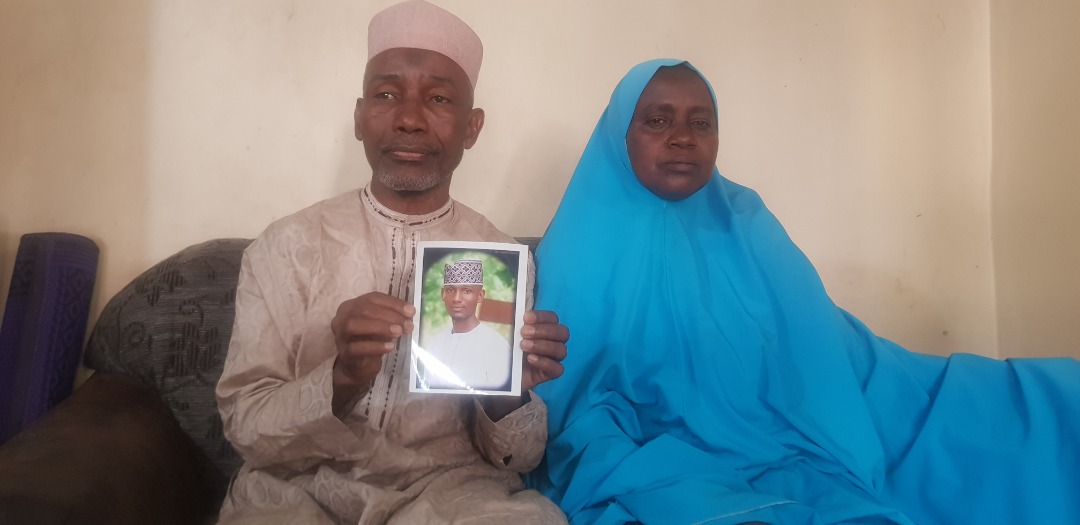On Tuesday, April 19, a woman died at the 44 Army Reference Hospital in Kaduna. Her name was Fatima Abubakar. She was 66 or thereabout. A mother of six, a wife and a grandmother. Yet, it would seem, to most people outside her family, that her life would be reduced to the last three years, which she spent waiting.
The first day I met her, when I went to interview her in her home in Kaduna, I liked her immediately. She set her small frame on a sofa in her living room, draped in a sky-blue hijab that fell to her feet, her smile belying the sadness in her eyes.
She liked me too. She called me baba na, because I was her father’s namesake, as was her 5th child, my namesake, and out of reverence for her father, she nicknamed her son Dadiyata. It would be that name that he would be known with, one that today continues to resonate and raise questions about how possible is it for a man and his car to disappear into the night for three long years without a trace.
In the early hours of Aug. 2, 2019, Abubakar Idris, a 34-year-old university lecturer, social media critic, husband and father of two little girls was followed to his house in Barnawa and abducted by some men in the dark. He has not been seen since.
The police have had no explanation, the DSS denied they had him in custody and three years later, his mother died not knowing what happened to him, where he is, or if he is ever going to return.
Over two years have passed since that afternoon in Kaduna when I sat on the carpet of her living room and spoke to her and her husband, Malam Idris Usman Yaro, about their missing son. Three years since he has been missing.
In the intervening years, we have spoken regularly on the phone. Often at her instance. “Baba na,” she would say with fondness each time she called.
“Na’am, kakata,” I would return because she too was my grandmother’s namesake.
She would ask about my well-being, how my work was going and how my family was doing? I would ask her how she and the family have been coping? She would make small talks, pray for me, for God to bless me. I would pray for her too for God to reveal where her son is, for him to be returned safely to her.
They were not long conversations, these phone calls, but they were heavy, weighed down by the things that were left unsaid, things that made them sink to the depth of your heart and alter the landscape of your mind.
I have accused myself of not calling her often. Each time I picked up the phone to dial her number, fear made me put the phone away—fear that my call would ignite hope in her that she would expect that I was calling with some news about her son, where he was, anything. So, I hardly ever called her. But she often did.
For a woman who lived for nearly seven decades, I guess her life would be referenced by the events of the last three years, the unbearable waiting for her favourite son to sweep aside the curtain on her door, to kneel down as he had always done to greet, to rest his head on her lap and gist her, as he always did, as he did the last time she saw him.
I can’t accurately imagine what it feels like but I Imagine it is a horrible thing to die waiting.
“Not knowing his whereabouts and in what condition he is in is unbearable,” she had said during my interview with her and her husband, who sat by her, their faces different yet similar—a comparison born out of living together for years, but mostly out of shared pain and stoicism.
“I know that this is a test from Allah and it is what Allah has destined that will prevail,” she had said. “I have resigned my fate to Allah and with all the prayers from well-wishers, I know he will be released when Allah says it’s time. But my prayer is to live to see that day.”
On Monday, April 18, Fatima had gone about her business as usual. According to her son, Usman, who spoke to a Daily Trust reporter, she had even paid a condolence visit to a relative.
But in the early hours of Tuesday, she woke up in distress, fell unconscious, and was rushed to the hospital where she would later die.
Her prayer had been to live to see that day.
It was Wole Soyinka, from whose book today’s column drew its title, albeit modified, who said, “The man dies in all who keep silent in the face of tyranny.” Fatima, powerless, hoped and prayed, her quiet voice and appeal eddying into the cacophonous void that Nigeria is. And then she died.
Looking back now, it would seem that in the Idris family, there has always been the fear of death, that it lurked in the shadows of their minds, that they feared Dadiyata might be dead but they nurse the hope that he is alive. Or that he might return home and find one of them gone.
“I worry a lot about the conditions he may be in and if at all when he comes back, he will find me alive,” his wife, Khadija, had said then, “I don’t know why I harbour such thoughts but that’s what comes to my mind when I think of him,” she said.
If Dadiyata were to return, I hope he would find his wife waiting, even if he would find that his mother is gone.
I did not know Dadiyata before his disappearance put him on the lips of a good number of Nigerians but apparently, we had met before. His wife told me.
“I know you,” she had said when I was ushered into her living room by her brother-in-law, Malam Usman. “We even took a photo with you.”
Her voice carried the weight of memories. Apparently, Dadiyata had brought his wife to a talk I gave at a literary festival in Kaduna. We had met and exchanged pleasantries chatted about something or the other and had posed for photographs.
I have no recollections of this because there was a crowd then but apparently, there is a photo of me and him and his wife somewhere. I wish now that I remembered what we talked about, that I have vivid recollections of that meeting.
In my years as a writer and especially in my journalism, I have met many relatives of victims of different crimes or injustices. Some like the Oguches, whose son was killed during the Kajuru Castle attack, the women who survived Boko Haram, the Chibok Girls, or the parents of a young hawker crushed to death by a truck outside a school in Keffi years ago, you will never forget. Some like Fatima Abubakar remain front and centre because you nurse hope for a happy ending to her suffering, because in a way you are waiting with her.
I had hoped to write about Dadiyata’s return, about how his mother would have jubilated. I had hoped to call her someday and congratulate her. But here we are: she, dead, rather suddenly, his wife and children waiting and me, with the heaviest of hearts, writing about the passing of a kind, gentle, loving mother, a woman who called me father. A woman who died waiting.
But her prayer had been to live to see that day.

 Join Daily Trust WhatsApp Community For Quick Access To News and Happenings Around You.
Join Daily Trust WhatsApp Community For Quick Access To News and Happenings Around You.


